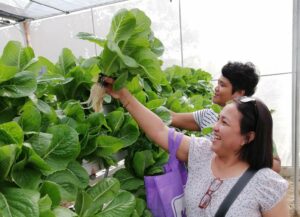Need to upskill agribusiness executives: The Dualtech Agritech approach

(Part 3)
I told the graduating participants of the Agribusiness Executives Program (AEP) that these strategies will remain at the theoretical level, unless their respective business enterprises operationalize them through concrete ac-tion programs in the short run, which must be reflected in their respective budgets for 2024 to 2025. I want to see in their plans for the current year their acquiring more hectares of land to reach more efficient scales; budg-eting larger amounts for the mechanization of their farming operations; diversifying into other food products, whether in livestock, vegetables and fruits benefiting from the technologies provided by such companies as East-West Seeds and Harbest Co.; being more daring in approaching the leading banks (including the Maharlika Investment Fund) to obtain longer-term credit for their diversification, digitalization or industrialization strate-gies; and, pursuing forward or backward linkages along the entire agribusiness supply chain.
They can study the experiences of the role models of Philippine agribusiness such as San Miguel Corp. that successfully diversified from being a food and beverage company to a major participant in the infrastructure, and transport and logistic sectors. It will not be long before these large agribusiness ventures, joined by medium-size companies like North Star Meat and Bounty Fresh, will loom large not only in the domestic market but become multinational giants in the food industry like Jollibee already is today.
As a last piece of advice, I told the graduates that as top executives of some of the leading agribusiness companies in the country, they have a serious responsibility to respond to the appeal of industry leaders, especially from the officers and members of the Philippine Chamber of Commerce and Industry, to be very involved in upskilling, reskilling, and retooling their respective workforces.
In this regard, let me describe here a very innovative approach to producing, as quickly as possible, highly skilled workers for the different phases of agribusiness, from farming to post-harvest to logistics and all the way to manufacturing of the finished food or feed products. I am referring to the launching of Project Dual Agritech by a group of businessmen, in cooperation with some technical schools. This is a combination of the French-inspired Family Farm School that was established in 1986 by an NGO called the Pampamilyang Paaralan Agrikultura Foundation in Batangas (inaugurated by the late President Corazon C. Aquino herself) and the now famous Dualtech Institute, put up with the help of a German foundation in 1981, that has turned out more than 10,000 electro-mechanic workers through the dual training system perfected in Germany.
The family farm approach had little success in the Philippines because the students were limited to the children of small farmers who are among the poorest in Philippine society, in contrast with the economically well-endowed French and Spanish farmers among whom the model was perfected. The early students of the family farm school were frustrated by the lack of resources of their farmer-parents who were unable to help them apply the new ap-proaches and technologies they were learning in the classroom.
The new approach of the Dual Agri-Tech collaboration model will not limit the students to children of farmers. In addition to learning modern farming techniques, the students will spend six months at the Dualtech campus to acquire electro-mechanical skills that are needed in such tasks as repairing and maintaining farm machinery, irrigation systems, post-harvest facilities, cold storage facilities, and other equipment. While at Dualtech, they will also develop digital skills that are increasingly needed in the various phases of agribusiness operations.
Both the Family Farm School in Dagatan, Lipa and the Dualtech are well known for giving as much importance to character or values formation as to technical competence.
As regards farming technology, the learning modules will be established in a 1,000-square meter pilot farm inside the school campus in Barangay Dagatan, Lipa, Batangas, together with a two- to three-hectare off-campus cooperator demo farm. The modules will showcase the latest technology and best practices of select crops’ value chain, from planting materials, growing, post-harvest, and processing. These modules will be used and main-tained by students at the Senior High School Technology and Livelihood Education strand.
As has already been perfected by Dualtech over more than 40 years, on-the-job training (OJT) corporate slots will be provided by cooperating agribusiness enterprises. The students will have access to OJT opportunities for six months on the farm or factory facilities of agribusiness companies in different parts of the Philippines. This will allow the trainees to acquire hands-on experience to perform as farm operators or as skilled workers in other phases of the agribusiness value chain. The host collaborating companies may provide regulated approved allowances for the trainees.
Through close collaboration among Technical Education and Skills Development Authority (TESDA), industry, and the academe (UA&P, for example, is providing the faculty for the IT component of Dualtech), it is hoped that this new skills training approach of the Dualtech Agritech School will be replicated by other groups in the agribusiness sector. I already am aware that family farm schools in other regions such as Mindoro, Iloilo, and Dumaguete are contemplating making the same transition towards a dualtech agritech curriculum.
This new initiative is a very concrete response to the appeal of President Ferdinand Marcos, Jr. in his second State of the Nation address for the business and academic communities to collaborate in modifying the K to 10 and K to 12 curricula to motivate more senior high school students to follow the TESDA track rather than continue pursuing college degree programs that do not produce employable workers. For more information about the Dualtech Agritech School, contact Rey dela Cruz at kingrcdc@gmail.com. n
Bernardo M. Villegas has a Ph.D. in Economics from Harvard, is professor emeritus at the University of Asia and the Pacific, and a visiting professor at the IESE Business School in Barcelona, Spain. He was a member of the 1986 Constitutional Commission.




